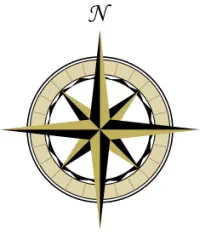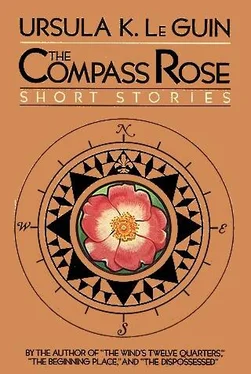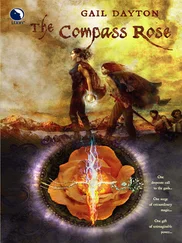Ursula Le Guin - The Compass Rose
Здесь есть возможность читать онлайн «Ursula Le Guin - The Compass Rose» весь текст электронной книги совершенно бесплатно (целиком полную версию без сокращений). В некоторых случаях можно слушать аудио, скачать через торрент в формате fb2 и присутствует краткое содержание. Жанр: Фантастика и фэнтези, на английском языке. Описание произведения, (предисловие) а так же отзывы посетителей доступны на портале библиотеки ЛибКат.
- Название:The Compass Rose
- Автор:
- Жанр:
- Год:неизвестен
- ISBN:нет данных
- Рейтинг книги:3 / 5. Голосов: 1
-
Избранное:Добавить в избранное
- Отзывы:
-
Ваша оценка:
- 60
- 1
- 2
- 3
- 4
- 5
The Compass Rose: краткое содержание, описание и аннотация
Предлагаем к чтению аннотацию, описание, краткое содержание или предисловие (зависит от того, что написал сам автор книги «The Compass Rose»). Если вы не нашли необходимую информацию о книге — напишите в комментариях, мы постараемся отыскать её.
From dream worlds to nightmare planets, through mazes of madness to tiny time holes in space, down Pathways of Desire to a New Atlantis, THE COMPASS ROSE points the way to the wonder-filled mind-country of a remarkable writer.
"As good as any contemporary at creating worlds, imaginary or our own… Le Guin writes with painstaking intelligence. Her characters are complex and haunting, and her writing is remarkable for it's sinewy grace."
—TIME Magazine
The Compass Rose — читать онлайн бесплатно полную книгу (весь текст) целиком
Ниже представлен текст книги, разбитый по страницам. Система сохранения места последней прочитанной страницы, позволяет с удобством читать онлайн бесплатно книгу «The Compass Rose», без необходимости каждый раз заново искать на чём Вы остановились. Поставьте закладку, и сможете в любой момент перейти на страницу, на которой закончили чтение.
Интервал:
Закладка:
Ourselves animals, active, predators, we look (naturally enough) for an active, predatory, communicative art; and when we find it, we recognise it. The development of this power of recognition and the skills of appreciation is a recent and glorious achievement.
But I submit that, for ail the tremendous advances made by therolinguistics during the last decades, we are only at the beginning of our age of discovery. We must not become slaves to our own axioms. We have not yet lifted our eyes to the vaster horizons before us. We have not faced the almost terrifying challenge of the Plant.
If a non-communicative, vegetative art exists, we must rethink the very elements of our science, and learn a whole new set of techniques.
For it is simply not possible to bring the critical and technical skills appropriate to the study of Weasel murder mysteries, or Batrachian erotica, or the tunnel sagas of the earthworm, to bear on the art of the redwood or the zucchini.
This is proved conclusively by the failure—a noble failure—of the efforts of Dr. Srivas, in Calcutta, using time-lapse photography, to produce a lexicon of Sunflower. His attempt was daring, but doomed to failure. For his approach was kinetic—a method appropriate to the communicative arts of the tortoise, the oyster, and the sloth. He saw the extreme slowness of the kinesis of plants, and only that, as the problem to be solved.
But the problem was far greater. The art he sought, if it exists, is a non-communicative art: and probably a non-kinetic one. It is possible that Time, the essential element, matrix, and measure of all known animal art, does not enter into vegetable art at all. The plants may use the meter of eternity. We do not know.
We do not know. All we can guess is that the putative Art of the Plant is entirely different from the Art of the Animal. What it is, we cannot say; we have not yet discovered it. Yet I predict with some certainty that it exists, and that when it is found it will prove to be, not an action, but a reaction: not a communication, but a reception. It will be exactly the opposite of the art we know and recognise. It will be the first passive art known to us.
Can we in fact know it? Can we ever understand it?
It will be immensely difficult. That is clear. But we should not despair. Remember that so late as the mid-twentieth century, most scientists, and many artists, did not believe that even Dolphin would ever be comprehensible to the human brain—or worth comprehending! Let another century pass, and we may seem equally laughable. “Do you realise,” the phytolinguist will say to the aesthetic critic, “that they couldn’t even read Eggplant?” And they will smile at our ignorance, as they pick up their rucksacks and hike on up to read the newly deciphered lyrics of the lichen on the north face of Pike’s Peak.
And with them, or after them, may there not come that even bolder adventurer—the first geolinguist, who, ignoring the delicate, transient lyrics of the lichen, will read beneath it the still less communicative, still more passive, wholly atemporal, cold, volcanic poetry of the rocks: each one a word spoken, how long ago, by the earth itself, in the immense solitude, the immenser community, of space.
The New Atlantis

Coming back from my Wilderness Week I sat by an odd sort of man in the bus. For a long time we didn’t talk; I was mending stockings, and he was reading. Then the bus broke down a few miles outside Gresham. Boiler trouble, the way it generally is when the driver insists on trying to go over thirty. It was a Supersonic Superscenic Deluxe Long Distance coalburner, with Home Comfort, that means a toilet, and the seats were pretty comfortable, at least those that hadn’t yet worked loose on their bolts, so everybody waited inside the bus; besides, it was raining. We began talking, the way people do when there’s a breakdown and a wait. He held up his pamphlet and tapped it—he was a dry-looking man with a schoolteacherish way of using his hands—and said, “This is interesting. I’ve been reading that a new continent is rising from the depths of the sea.”
The blue stockings were hopeless. You have to have something besides holes to darn onto. “Which sea?”
“They’re not sure yet. Most specialists think the Atlantic. But there’s evidence it may be happening in the Pacific too.”
“Won’t the oceans get a little crowded?” I said, not taking it seriously. I was a bit snappish, because of the breakdown, and because those blue stockings had been good warm ones.
He tapped the pamphlet again and shook his head, quite serious. “No,” he said. “The old continents are sinking, to make room for the new. You can see that that is happening.”
You certainly can. Manhattan Island is now under eleven feet of water at low tide, and there are oyster beds in Ghirardelli Square.
“I thought that was because the oceans are rising from polar melt.”
He shook his head again. “That is a factor. Due to the greenhouse effect of pollution, indeed Antarctica may become inhabitable. But climatic factors will not explain the emergence of the new—or, possibly, very old—continents in the Atlantic and Pacific.” He went on explaining about continental drift, but I liked the idea of inhabiting Antarctica, and daydreamed about it for a while. I thought of it as very empty, very quiet, all white and blue, with a faint golden glow northward from the unrising sun behind the long peak of Mount Erebus. There were a few people there; they were very quiet, too, and wore white tie and tails. Some of them carried oboes and violas. Southward the white land went up in a long silence towards the pole.
Just the opposite, in fact, of the Mount Hood Wilderness Area. It had been a tiresome vacation. The other women in the dormitory were all right, but it was macaroni for breakfast, and there were so many organised sports. I had looked forward to the hike up to the National Forest Preserve, the largest forest left in the United States, but the trees didn’t look at all the way they do in the postcards and brochures and Federal Beautification Bureau advertisements. They were spindly, and they all had little signs on, saying which union they had been planted by. There were actually a lot more green picnic tables and cement Men’s and Women’s than there were trees. There was an electrified fence all around the forest to keep out unauthorised persons. The Forest Ranger talked about mountain jays, “bold little robbers,” he said, “who will come and snatch the sandwich from your very hand,” but I didn’t see any. Perhaps because it was the weekly Watch Those Surplus Calories! Day for all the women, and so we didn’t have any sandwiches. If I’d seen a mountain jay I might have snatched the sandwich from his very hand, who knows. Anyhow it was an exhausting week, and I wished I’d stayed home and practised, even though I’d have lost a week’s pay because staying home and practising the viola doesn’t count as planned implementation of recreational leisure as defined by the Federal Union of Unions.
When I came back from my Antarctic expedition the man was reading again, and I got a look at his pamphlet; and that was the odd part of it. The pamphlet was called “Increasing Efficiency in Public Accountant Training Schools,” and I could see from the one paragraph I got a glance at that there was nothing about new continents emerging from the ocean depths in it—nothing at all.
Then we had to get out and walk on into Gresham, because they had decided that the best thing for us all to do was get onto the Greater Portland Area Rapid Public Transit Lines, since there had been so many breakdowns that the charter bus company didn’t have any more busses to send out to pick us up. The walk was wet, and rather dull, except when we passed the Cold Mountain Commune. They have a wall around it to keep out unauthorised persons, and a big neon sign out front saying “Cold Mountain Commune,” and there were some people in authentic jeans and ponchos by the highway selling macrame belts and sand-cast candles and soybean bread to the tourists. In Gresham, I took the 4:40 GPARTL Superjet Flyer train to Burnside and East 230th, and then walked to 217th and got the bus to the Goldschmidt Overpass, and transferred to the shuttlebus, but it had boiler trouble too, so I didn’t reach the downtown transfer point until 8:10, and the busses go on a once-an-hour schedule at eight, so I got a meatless hamburger at the Longhorn Inch-Thick Steak House Dinerette and caught the nine o’clock bus and got home about ten. When I let myself into the apartment I turned on the lights, but there still weren’t any. There had been a power outage in West Portland for three weeks. So I went feeling about for the candles in the dark, and it was a minute or so before I noticed that somebody was lying on my bed.
Читать дальшеИнтервал:
Закладка:
Похожие книги на «The Compass Rose»
Представляем Вашему вниманию похожие книги на «The Compass Rose» списком для выбора. Мы отобрали схожую по названию и смыслу литературу в надежде предоставить читателям больше вариантов отыскать новые, интересные, ещё непрочитанные произведения.
Обсуждение, отзывы о книге «The Compass Rose» и просто собственные мнения читателей. Оставьте ваши комментарии, напишите, что Вы думаете о произведении, его смысле или главных героях. Укажите что конкретно понравилось, а что нет, и почему Вы так считаете.




